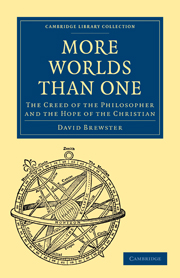Book contents
- Frontmatter
- Contents
- PREFACE
- INTRODUCTION
- CHAP. I Religious Aspect of the Question
- CHAP. II Description of the Solar System
- CHAP. III The Geological Condition of the Earth
- CHAP. IV Analogy between the Earth and the other Planets
- CHAP. V The Sun, Moon, Satellites, and Asteroids
- CHAP. VI The Motion of the Solar System round a distant Centre
- CHAP. VII Religious Difficulties
- CHAP. VIII Single Stars and Binary Systems
- CHAP. IX Clusters of Stars and Nebulæ
- CHAP. X General Summary
- CHAP. XI Reply to Objections drawn from Geology
- CHAP. XII Objections from the Nature of Nebulæ
- CHAP. XIII Objections from the Nature of the Fixed Stars and Binary Systems
- CHAP. XIV Objections from the Nature of the Planets
- CHAP. XV The Future of the Universe
CHAP. XIII - Objections from the Nature of the Fixed Stars and Binary Systems
Published online by Cambridge University Press: 29 August 2010
- Frontmatter
- Contents
- PREFACE
- INTRODUCTION
- CHAP. I Religious Aspect of the Question
- CHAP. II Description of the Solar System
- CHAP. III The Geological Condition of the Earth
- CHAP. IV Analogy between the Earth and the other Planets
- CHAP. V The Sun, Moon, Satellites, and Asteroids
- CHAP. VI The Motion of the Solar System round a distant Centre
- CHAP. VII Religious Difficulties
- CHAP. VIII Single Stars and Binary Systems
- CHAP. IX Clusters of Stars and Nebulæ
- CHAP. X General Summary
- CHAP. XI Reply to Objections drawn from Geology
- CHAP. XII Objections from the Nature of Nebulæ
- CHAP. XIII Objections from the Nature of the Fixed Stars and Binary Systems
- CHAP. XIV Objections from the Nature of the Planets
- CHAP. XV The Future of the Universe
Summary
Having, as our author congratulates himself, “cleared away the supposed inhabitants from the outskirts of creation, so far as the nebulæ are the outskirts of creation,” he proceeds to consider the fixed stars, and examine any evidence which he may be able to discover as to the probability of their containing in themselves, or in their accompanying bodies, as planets, inhabitants of any kind. We have already stated the grounds upon which the most distinguished astronomers have believed that single and double stars are accompanied with planets similar to our own; and we shall now consider the objections which are made to this opinion.
Beginning with clusters of stars, the author whose opinions we have been controverting, justly observes, that they are in the same category with resolvable nebulæ, and he therefore regards it as “a very bold assumption to assume, without any farther proof, that these bright points are suns, distant from each other as far as we are from the nearest stars. When these clusters are globular, Sir John Herschel regards their form as “indicating the existence of some general bond of union in the nature of an attractive force;” and assuming that the “globular space may be filled with equal stars, uniformly dispersed through it, and very numerous, each of them attracting every other with a force inversely as the square of the distance, … each star would describe a perfect ellipse about the common centre of gravity as its centre,” Sir John therefore conceives that “such a system might subsist, and realize in a great measure that abstract and ideal harmony which Newton has shewn to characterize a law of force directly as the distance.”
- Type
- Chapter
- Information
- More Worlds Than OneThe Creed of the Philosopher and the Hope of the Christian, pp. 219 - 232Publisher: Cambridge University PressPrint publication year: 2009First published in: 1854



